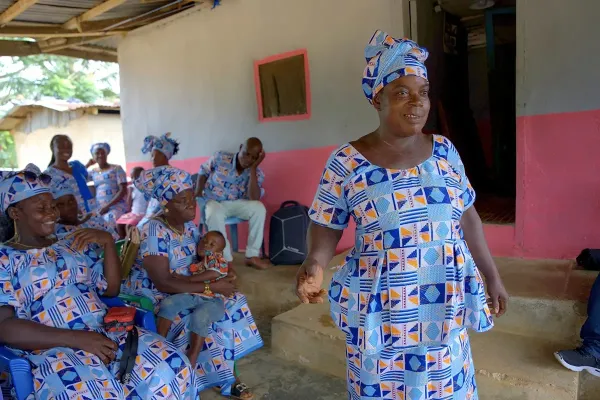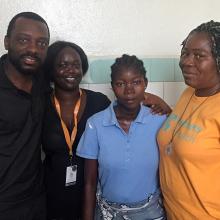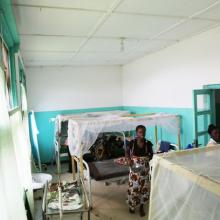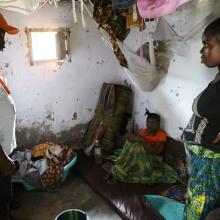Content warning: This story mentions suicide.
The joyful noise of Gedetarbo Women’s Group takes over the usual quietude of a small village in rural Liberia. Women well-dressed in colorful lappas and head ties sing a song in Grebo dialect, dance, and parade to the Clan Chief’s home. The thirteen-member Partners In Health (PIH)-supported group typically gathers once a week to receive advice and encouragement. This time, they’ve come together to celebrate and reflect on their recent achievements.
During the program, 48-year-old Cecelia Green, one of five members of the group who benefitted from PIH Liberia ’s economic empowerment program, is called to share her testimony. Green is a widow and mother to two surviving children, a girl and a boy. She lost her third and fourth sons to a brief illness and an accident, respectively. Her husband worked as a rubber tapper and was the primary breadwinner, until he passed in 2010. After his death, she quickly began to face many challenges.
In 2012, she was asked to leave her home, a staff residence owned by her husband’s employer. She moved to a leaking, unfinished house in Gedetarbo.
“It was almost like we were living outside. I was so frustrated that I used to sit and just talk by myself,” says Green. “Sometimes, I would just hear strange voices, but I couldn’t see anyone.”
Years later, she met staff from PIH Liberia, and now her life looks much different. “I am grateful to Partners In Health for restoring my life,” she says.
Wearing a gentle smile, Alexander Williams, Gedetarbo clan chief, attentively watches and listens to her testimony. Jubilant applause from him and the other women greets an enlivened Green as she finishes and cheers for herself.
“I visited Cecelia and realized that the house was not safe for people to live in,” says Williams. “I asked her to move into a house whose owner had died and there were no occupants in it.”
Green and her children moved into the house shortly after Williams’ visit. While grateful for the kind gesture, it didn’t stop her from worrying about how the children of the deceased landlord would one day come to claim their father’s house and ask them to move, again.
“I always thought that once the children of the man who owned the house grew up, they would come for their property and put us out. This was not the kind of life that I wanted to live,” reflects Green. “So, I decided that I was going to kill myself. I bought poison and carried it to the house, but I didn’t consume it right away.”
Finding Support, Accompaniment
In 2021, members of PIH Liberia’s mental health team visited Gedetarbo for a community outreach event led by Garmai Cyrus-Biddle, mental health coordinator. At the time, Gedetarbo Women’s Group existed, but it was poorly structured and lacked direction. Several months later, the group was restructured with clear objectives to support mental health and well-being.
“Our first [mental health] screening in Gedetarbo revealed that ten women were severely depressed and some of them had attempted suicide multiple times,” says Cyrus-Biddle.
Those identified were referred to PIH-supported Pleebo Health Center and were placed on a six-month treatment regimen, involving therapy and medication.
“When I took the medicine, I slept very well for the first time in a long time,” Green recalls. “I also noticed that the [overthinking] reduced.”
Economic Empowerment
After completing treatment, Green and four other women received additional social support , including $100 each. At first, Green wasn’t sure what to do with the money.
“Then God gave me the idea to start a business … by buying six, 25kg bags of rice to sell,” she says.
Green began crediting the rice to staff at the rubber company, where her late husband had worked, through an arrangement locally known as “sell-pay.” It’s a mutual agreement where the seller gives the goods to the customer on credit for a given period with interest. At the end of the period, Green received $25 per 25kg bag of rice.
After about six months, her inventory grew to include various alcoholic and non-alcoholic beverages, ultimately growing her profit to over $500. Ten months later, her savings grew to $900. She purchased a motorcycle, the most easily accessible mode of transportation through rural Liberia’s dirt roads, to begin a transportation business.
Her businesses continued to grow alongside her savings.
“After some time when I told people that I was going to build a house, they could not believe me,” Green excitingly recollects. “I used $150 to buy wood and $1,000 to buy the zinc.”
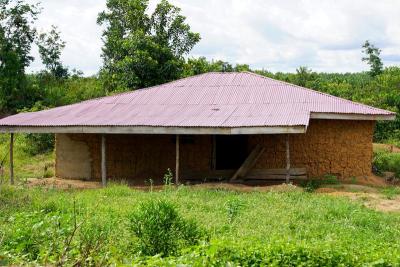
Cecelia Green’s recently constructed home in Maryland County, Liberia.
Photo by Ansumana O. Sesay / Partners In Health
Green built a five-bedroom house in Gedetarbo. Each of her children have their own room in the house and there’s even an extra room for guests. There is no bathroom, doors and windows yet. She hopes to rebuild her savings that she exhausted to buy construction materials for the house itself. Then she will buy materials needed for the finishing touches.
When the testimonies end, Green leads members of the Gedetarbo Women’s Group and others to tour her newly constructed home. As the tour concludes, Green smiles and says: “PIH saved my life. If I die today, I know I will go to heaven and I will be at peace.”
